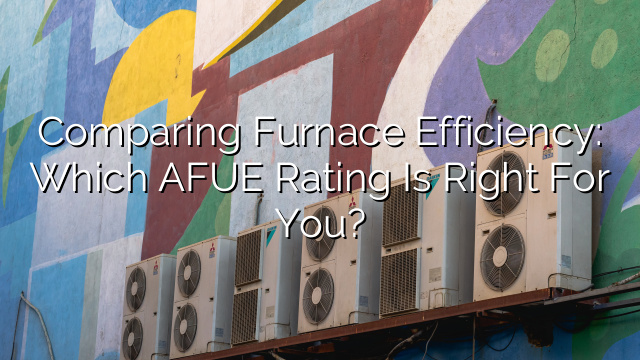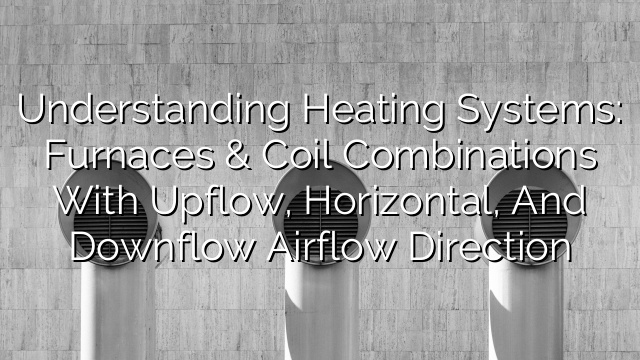Heating, Furnaces & Coil Combinations
When it comes to heating your home, there are several options available. One popular choice is a furnace, which uses fuel to generate heat. In combination with a coil, which helps cool the air in summer months, furnaces can provide year-round comfort.
But with so many options on the market, how do you choose the right combination for your home? In this article, we’ll explore furnace efficiency, AFUE ratings, and how to determine which rating is right for you.
Furnace Efficiency / AFUE: 80%, 92%, 96%
Furnace efficiency is measured by an AFUE (Annual Fuel Utilization Efficiency) rating. This rating indicates the percentage of fuel that is converted into heat. The higher the AFUE rating, the more efficient the furnace.
A furnace with an AFUE rating of 80% means that 80% of the fuel is converted into heat, while the remaining 20% is lost through exhaust gases. An AFUE rating of 92% indicates that 92% of the fuel is converted into heat, with only 8% lost. And a furnace with a 96% AFUE rating is highly efficient, with only 4% of the fuel lost.
When comparing furnace efficiency, it’s important to consider factors such as the cost of fuel, climate, and your individual heating needs. While a higher AFUE rating may seem attractive, it may not always be the most cost-effective option for your specific circumstances.
Choosing the right furnace efficiency for your home requires careful consideration of several factors:
- Climate: If you live in a colder climate where heating costs are high, a furnace with a higher AFUE rating may be a wise investment. The more efficient the furnace, the less fuel it will require to heat your home.
- Usage: How often do you use your furnace? If you rely heavily on heating, a higher AFUE rating can help you save on energy costs over time. However, if you only use your furnace occasionally, a lower AFUE rating may be sufficient.
- Budget: Consider your budget and the initial cost of the furnace. Furnaces with higher AFUE ratings may be more expensive upfront, but they can provide long-term energy savings. If you have a limited budget, you may opt for a furnace with a slightly lower AFUE rating.
- Fuel Costs: Research the cost of the fuel used by each furnace type in your area. This will help you determine the potential savings you could achieve with a higher AFUE rating.
By considering these factors, you can determine which AFUE rating is right for your needs. It’s important to find the right balance between efficiency and cost to maximize your home heating savings.
Choosing the Right Furnace and Coil Combination
In addition to furnace efficiency, it’s crucial to choose the right coil combination for optimal heating and cooling performance. The coil is an essential component of an HVAC system, responsible for transferring heat between the furnace and the air conditioner.
When selecting a coil, make sure it is compatible with your furnace model and capacity. A properly matched furnace and coil combination ensures efficient operation, better airflow, and extended equipment life.
Consult a professional HVAC technician to help you choose the best furnace and coil combination for your home. They can assess your specific heating and cooling needs, consider your budget, and guide you towards the most suitable options.
Frequently Asked Questions (FAQ)
Q: Are higher AFUE-rated furnaces worth the additional cost?
A: Higher AFUE-rated furnaces can provide long-term energy savings, especially in colder climates or if you rely heavily on heating. However, the additional cost should be weighed against your budget and the potential fuel costs in your area.
Q: Can I replace just the furnace or coil?
A: In some cases, it may be possible to replace only the furnace or the coil. However, replacing both components is often recommended for optimal efficiency and performance.
Q: How often should I have my furnace and coil inspected?
A: It’s essential to have your furnace and coil inspected at least once a year by a professional HVAC technician. Regular maintenance can help maximize efficiency, prevent breakdowns, and extend the lifespan of your equipment.
Q: How long do furnaces typically last?
A: The average lifespan of a furnace is around 15-20 years. However, regular maintenance and proper usage can help extend its lifespan.
In conclusion, choosing the right furnace and coil combination involves considering factors such as climate, usage, budget, and fuel costs. By understanding AFUE ratings, you can make an informed decision that maximizes energy efficiency and cost savings for your home heating needs.




